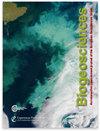深含水层中微生物甲烷的形成与沿海地区沉积物的埋藏历史有关
IF 3.9
2区 地球科学
Q1 ECOLOGY
引用次数: 0
摘要
摘要。阐明地下环境中微生物甲烷形成的机制对于了解全球碳循环至关重要。本研究考察了天然含气沉积含水层在整个沉积物埋藏历史中微生物甲烷形成(即甲烷生成)的过程。从六个不同深度的含水层采集的水样显示出从盐水到淡水的盐度垂直梯度和从嗜中到嗜心理的温度垂直梯度。对气体和水的同位素比值以及微生物群落的分析表明,甲烷主要是通过二氧化碳还原作用产生的。然而,水的氢同位素比值随着深度和盐度梯度的变化而变化,而甲烷的同位素比值变化不大,这表明浅层沉积物中的原位甲烷生成对含水层中甲烷的产生作用不大。在最深的含盐含水层中,产甲烷微生物(甲烷菌)的数量最多,因为那里的水温、盐度和邻近泥质沉积物的总有机碳含量最高。对含水层中主要的产氢甲烷菌进行培养后发现,在与最深含水层温度相对应的温度下,产甲烷速率最大。这些结果表明,深埋沉积物中的高温条件与原地甲烷生成增强有关,在最深含水层中形成的甲烷通过扩散作用向上迁移到较浅的含水层中。本文章由计算机程序翻译,如有差异,请以英文原文为准。
Microbial methane formation in deep aquifers associated with the sediment burial history at a coastal site
Abstract. Elucidating the mechanisms underlying microbial methane formation in subsurface environments is essential to understanding the global carbon cycle. This study examined how microbial methane formation (i.e., methanogenesis) occurs in natural-gas-bearing sedimentary aquifers throughout the sediment burial history. Water samples collected from six aquifers of different depths exhibited ascending vertical gradients in salinity from brine to fresh water and in temperature from mesophilic to psychrophilic conditions. Analyses of gas and water isotopic ratios and microbial communities indicated the predominance of methanogenesis via CO2 reduction. However, the hydrogen isotopic ratio of water changed along the depth and salinity gradient, whereas the ratio of methane changed little, suggesting that in situ methanogenesis in shallow sediments does not significantly contribute to methane in the aquifers. The population of methane-producing microorganisms (methanogens) was highest in the deepest saline aquifers, where the water temperature, salinity, and total organic carbon content of the adjacent mud sediments were the highest. Cultivation of the dominant hydrogenotrophic methanogens in the aquifers showed that the methanogenesis rate was maximized at the temperature corresponding to that of the deepest aquifer. These results suggest that high-temperature conditions in deeply buried sediments are associated with enhanced in situ methanogenesis and that methane that forms in the deepest aquifer migrates upward into the shallower aquifers by diffusion.
求助全文
通过发布文献求助,成功后即可免费获取论文全文。
去求助
来源期刊

Biogeosciences
环境科学-地球科学综合
CiteScore
8.60
自引率
8.20%
发文量
258
审稿时长
4.2 months
期刊介绍:
Biogeosciences (BG) is an international scientific journal dedicated to the publication and discussion of research articles, short communications and review papers on all aspects of the interactions between the biological, chemical and physical processes in terrestrial or extraterrestrial life with the geosphere, hydrosphere and atmosphere. The objective of the journal is to cut across the boundaries of established sciences and achieve an interdisciplinary view of these interactions. Experimental, conceptual and modelling approaches are welcome.
 求助内容:
求助内容: 应助结果提醒方式:
应助结果提醒方式:


